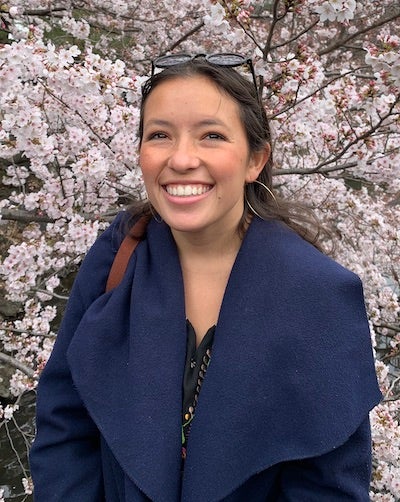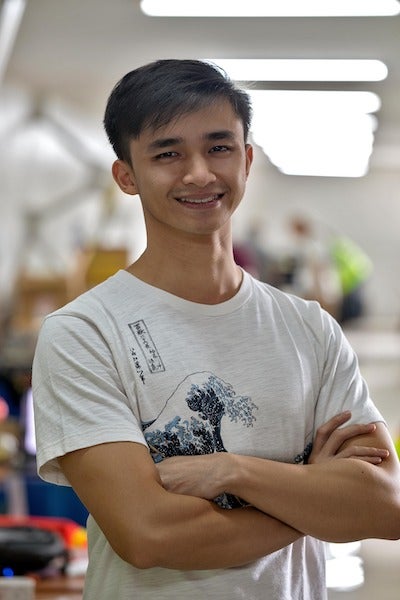UCAR announces 2022 Next Generation Fellows cohort
Distinguished UCAR program supports Earth system science students
Dec 6, 2022 - by Ali Branscombe
The NSF NCAR Mesa Lab, Fleischmann building, and Mesa Lab Road will be closed through Friday, Dec. 27, due to nearby water leak and repairs.
View more information.Dec 6, 2022 - by Ali Branscombe
The University Corporation for Atmospheric Research (UCAR) has announced the recipients of the prestigious Next Generation Fellowship for 2022. This fellowship is awarded each year to three Earth system science students from historically underrepresented groups who are looking to gain experience in scientific research, policy, and diversity and inclusion. The 2022 recipients are: Gabriela Negrete-García, public policy fellow; Miguel Ricardo Hilario, Earth system science fellow; Corinne Arrington Salter, diversity and inclusion fellow.
“This represents our sixth cohort of accomplished Earth system science students, and I continue to be impressed with each fellow’s goals and ambitions to apply their scientific knowledge to ongoing societal challenges,” said UCAR President Antonio Busalacchi.
As fellows, Negrete-García, Hilario, and Salter will receive financial and academic support in their professional pursuits for the next two years. After completing the fellowship, they will join the growing list of program alumni who are applying their skills to research and problem-solving in the broader Earth system science community.
“The Next Generation Fellowship is now a firmly established program and I am pleased that we have reached a point where our program alumni are now putting their fellowship experience into practice beyond UCAR and achieving fantastic things,” said Busalacchi. “I anticipate the same for the future of these incoming fellows.”
More information about the fellowships and the application process can be found on the UCAR website.

Gabriela Negrete-García represents many firsts for her family. She is a first-generation Mexican-American, and the first to attend college and grad school. She credits her parents, teachers, and mentors for the support and encouragement that helped Negrete-García develop her passion for research and biological oceanography, which is the field in which she is pursuing a doctorate. Negrete-García’s research focuses on the impacts of climate change on phytoplankton communities in the Arctic ocean. She has developed a model feature that represents biodiverse plankton communities that can be embedded in a global circulation model. This work will ultimately help scientists understand how these seemingly small organisms play such a significant role in the food webs and biochemical cycles of the Arctic.
As a public policy fellow, Negrete-García is hoping to use her research experience in ocean ecosystems “to protect communities, livelihoods, and ecosystems that will be most affected by climate change,” she said. She sees the policy-crafting process as an opportunity to learn more about putting her science into action. It is also an opportunity to be a voice and representation for under-served communities who have not historically had an opportunity to shape climate policy.
“Incorporating the opinions and expertise of a diverse community of scientists and policymakers will provide a seat on the table for populations that are traditionally dismissed and unaccounted for,” she said. “To become a better scientist, communicator, and advocate for environmental change, I need to learn transdisciplinary skills through public policy.”
During her fellowship, Negrete-García will gain experience working with UCAR staff to translate scientific research into resources useful for crafting policy in Washington, D.C. Negrete-García earned her bachelor’s degree in chemistry at the University of Wisconsin-Madison and her master’s in biological oceanography from Scripps Institution of Oceanography.

Miguel Ricardo Hilario’s passion for atmospheric science shines in the way he talks about atmospheric science, particularly when he describes his goals and the broader impact of his research. “From my undergraduate days, I was always drawn towards data-driven research with social relevance,” said Hilario. “Atmospheric science checks both boxes. With opportunities like this fellowship, I feel part of a bigger community of atmospheric scientists and that my research contributes to advancing that bigger picture.”
Hilario earned two bachelor’s degrees from Ateneo de Manila University, one in applied physics and material science and also in engineering, plus a minor in data science. Before earning his master’s in atmospheric science, Hilario worked as a research assistant at the Manila Observatory. He also worked on NASA’s CAMP2Ex (the Cloud, Aerosol, and Monsoon Processes Philippines Experiment) as a member of the weather forecasting team. Now Hilario’s doctoral research at the University of Arizona focuses on analyzing the long-range transportation of polluted air in the tropical West Pacific region.
“Much of my work to date has been based on observational data, but to achieve more impact on a societal level, there must be a greater connection between field and lab data with models,” said Hilario. During his fellowship, Hilario will work with NCAR scientist Mary Barth in the atmospheric chemistry laboratory to learn new methods to analyze data collected during field campaigns with the goal of improving how chemistry models simulate pollution moving in the atmosphere.
Hilario is a first-generation doctoral student in his family, and he already dreams of mentoring other rising scientists in his home country, the Philippines. “My long-term goal is to mentor young Filipinos and foster a greater appreciation for science back home,” he said. “I want to shift that cultural perception by becoming a world-class atmospheric scientist and a valuable first step towards that vision is professional development at renowned institutions like NCAR.”
Growing up in the hurricane-prone state of Louisiana, Corinne Arrington Salter has witnessed firsthand the impacts of extreme weather on vulnerable communities. This experience is the driving force that has inspired them to study environmental justice in the hopes of finding solutions and helping build community resilience.
Salter’s family history traces back to the Marshall Islands, a chain of islands in the central Pacific Ocean which are particularly vulnerable to sea level rise related to climate change. Salter’s passion for promoting diversity, equity, and inclusion (DEI) in scientific fields and environmental decision-making is due to their connections to these multiple communities that exist on the front lines of climate change impacts.
“I hope to bring awareness and attention to marginalized issues and foster an inclusive space for diverse voices to be heard and represented,” said Salter.
While pursuing a doctorate in environmental sciences, Salter has also co-founded a school group focused on climate and social activism called the Climate Pelicans. They also earned bachelor’s degrees in criminal justice and Spanish from the University of Louisiana at Lafayette.
Salter credits the supportive upbringing from their two adoptive moms for their achievements thus far, and Salter also hopes to use this momentum to pave the way for other underrepresented identities in science. During their fellowship, Salter will use their combined experience as a nonbinary scientist and DEI professional to support the organization's ongoing efforts to improve hiring practices and make connections to diverse job candidates. Ultimately this goal aligns with UCAR’s own strategic initiatives to ensure an effective and inclusive workforce that is prepared to meet global challenges with diverse research.
“I want to listen to diverse experiences from these communities and uplift their voices and provide a platform for them to further offer their experiences to the sciences, while not talking over those with experiences different from my own,” said Salter.